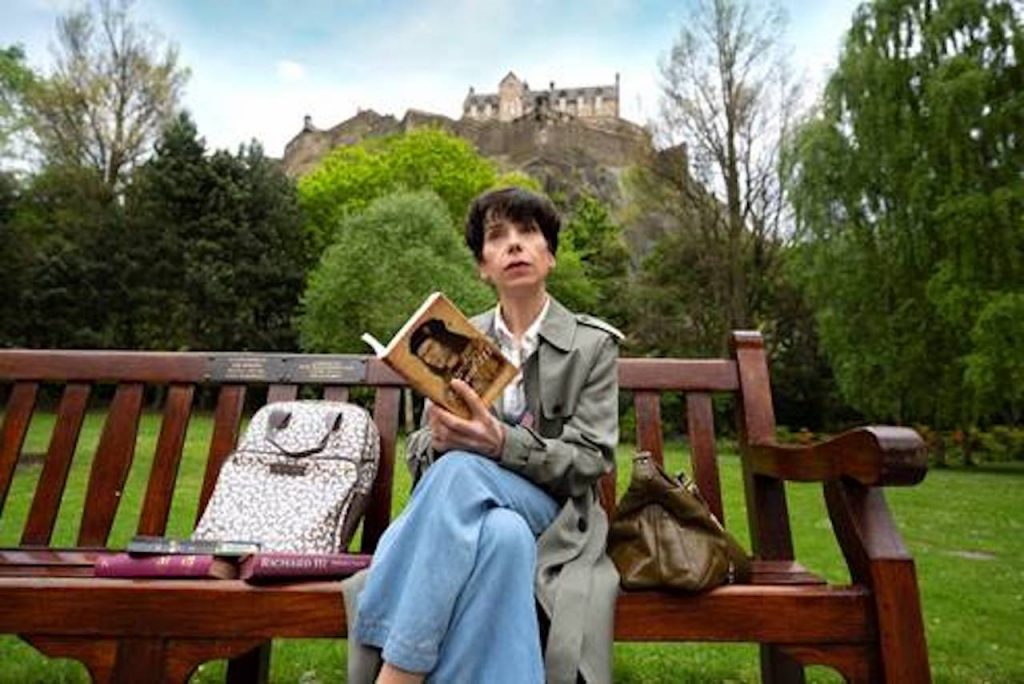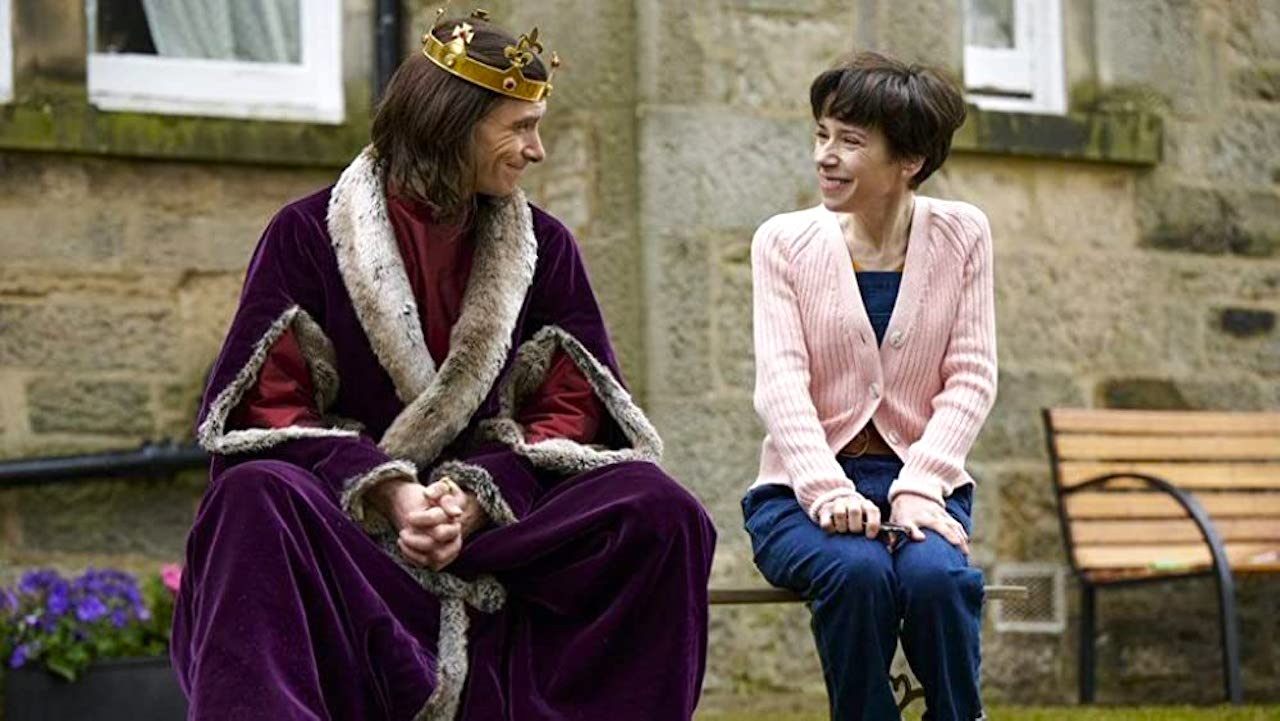“Now is the winter of our discontent, Made glorious summer by this sun of York,” is one of the most famous quotes from Shakespeare’s Richard III. It resonates with everyone because it evokes the change of seasons, in climate and life.
In that play, King Richard is portrayed as murderous and an eyesore. Inquisitive writer Philippa Langley became intrigued with his true story after seeing a play about him and felt Shakespeare grossly misrepresented him. She discovered just how much creative license Shakespeare took in his portrayal of the troubled king once she went down the rabbit hole of doing research on the supposedly errant king. Her obsession with and appreciation for Richard III is the basis of the IFC Films release The Lost King. It stars award winning actors Sally Hawkins and Steve Coogan, as well as Harry Lloyd, Robert Jack, and John-Paul Hurley.
Director Stephan Frears (Dangerous Liaisons, The Queen, Philomena), Steve Coogan (Chivalry, Alan Partridge series, Philomena), and Jeff Pope (Cilla, Stan & Ollie, Philomena) were involved with Oscar-nominated Philomena (2013) and the trio reunited for this quiet, life-affirming movie. Writer/producer Jeff Pope is no stranger to writing true stories. He’s covered everything from true crime to classic entertainers Stan Laurel and Oliver Hardy in Stan & Ollie. A doyen of film and television, he and Steve Coogan have written a sensitive portrait of a woman not only in search of Richard III, but of herself.
Jeff recently spoke with Creative Screenwriting Magazine about The Lost King and his writing process in general.
At what part of the process were you brought in for The Lost King?
Steve Coogan and I worked together on Philomena. This was something in the aftermath of that project Steve had fastened onto. He came to me with an idea. It took a long time but between the two of us, we started to move the piece forward. The thing that kicked it off was a four day trip to Edinburgh where we spent time with Philippa, which is when we really started to drill down into the story.
How much input did she have on the project?
A lot. It’s very much our version of her story. We’re impartial sets of eyes looking at the totality of the events and it’s our perception, our pass, at the story. But we stayed in contact with her throughout and spent a lot of time before, during, and after we scripted. During filming, she came to the set. There’s a wonderful cameo where she appears in the church at the end as the body is laid to rest.

Jeff Pope. Photo courtesy of IFC Films
What strengths do you think Steve, as an actor, brings to scriptwriting?
One of the great things about working with Steve is that he doesn’t think in a classic style. He’s not by the numbers. As you know, he does some fantastic work in front of the camera as well. One of the things is that he’s an incredible mimic. In the early part of his career, he was on a satirical show, where he did voices that impersonated famous people of the day.
What it means for me writing with him is that as we are progressing and he’ll want to pursue a line of dialogue or just free flow, he does it as the character. He’ll be Philippa, he’ll be John, he’ll be Richard Buckley, he’ll be Richard III. The voices are different. Writing with him is a really interesting and exciting experience.
How much did you know about Richard III prior to the project?
We only really knew the basics, as per Shakespeare’s Richard III. The he was evil. That he was so ugly that dogs barked at him. That he was a ‘hunchback.’ We had these things at the back of our minds as we went into it. But we really needed to research Richard III as well. Shakespeare wrote his play over a hundred years after Richard III’s death. He was writing about quite distant history. That’s where Philippa was coming from. We had to go on a crash course into Richard III, as well as Philippa and everything else about the story so that we could understand why she felt differently and passionately about how unfair history seems to have treated Richard III.
Did you find out anything that Philippa Langley hadn’t already discovered?
No, not so much. It’s interesting. The most startling discovery for me was that the notion in English law, which is certainly espoused in American law as well, is innocent until proven guilty. That was introduced into English law during the reign of Richard III. It’s interesting that that’s when it dates from. It also told me that that doesn’t sound like an evil dictator who would commit murder to get people out of his way. That’s Hitler and Stalin and people like that. They certainly wouldn’t have wanted everyone to have a fair trial. The process of writing this involved pulling together stuff that was already out there. This is what Philippa did and what happened with finding the remains.
Why do you think Stephen Frears was the ideal director for this?
Because he’s something of an outsider too. He’s never played the studio game with his movies.
I think thumbing your nose at what up until now has been the accepted history of Richard was attractive. The idea of telling a story about whether Richard III was as evil as Shakespeare made him out to be appealed to his sense of mischievousness. And secondly, I think Stephen loves an underdog. I think he felt there was some kind of bite to the way Philippa was sidelined after making this incredible discovery.
I notice you’ve written about true stories and real people quite a bit. What’s most daunting about this?
Well, there’s a great responsibility, especially if the people you’re writing about are still around. The reason why I’m attracted to writing about actual events is because inherently if you go deep enough into the story, therein lies the way to avoid clichés. It’s because we all behave differently towards each other. We behave differently and uniquely. My process is to find things you haven’t seen before. That’s what intrigued me about this story. If you really get it right, you present in the movie a story that people are absorbed by, that takes them to emotional highs and lows. When there’s a caption that says “Based on a true story,” I think that adds another dimension to it.

Phillips Langley (Sally Hawkins) Photo courtesy of IFC Films
Do you prefer writing solo or collaborating?
I don’t have a preference. I like both. There are some people I love writing with. I enjoy writing by myself as well.
When you sit down to start a script, what’s the first thing you focus on?
My process is to spend a long time absorbing as much as I can in terms of research. Then, it’s making ever-increasingly sophisticated bullet points. Start here, then go here, and then here. I’ll stagger through the story like that. Then I’ll refine that. Start here. What does that mean? Well, in that bit, this happens, this happens, and this happens. Then you go to the next bit and you expand that. When I start to write the script, that’s relatively quick because I’ve spent so much time building up to that moment.
Do you have the same process for screenplays as you do for TV?
Yes. I’ve been around long enough that I remember when the big difference between television and film was budget. You’d have more money to play with for movies than for television. Of course, now, with streamers, there’s not a big difference in budget. Generally, my first pass is to give the story what I think it deserves. When reality kicks in and I think about how much money we have to make the project, that’s when I’ll try to adjust the script to how much money we have available.
That’s a perfect segue to my next question. How have you seen the screenwriting business change since you first started?
I think it’s more polarized now. There are so many pieces now that are fantasy and superheroes. I’m not disparaging them. They’re very popular. I’d say the fantasy stuff is becoming more fantastic and the reality stuff is becoming more realistic.
What excites you most about writing?
I’m always thinking about what my wife will think when she watches it. Also, you want to knock people out, wow them with your work, don’t you?
How did you first get started writing?
I was a journalist. I worked on reality programs. Crime was a big part of those programs. The first real drama that I wrote was about a very famous crime in Britain. It was about the biggest theft in British history of bullion. At the time, it felt like a small step from what I was doing to writing a drama. Now I look back and that was quite a big step.
What’s the message you want most people to take away from The Lost King?
Philippa Langley found Richard III because she plugged into her intuition. Academia, scientific research, and university lecturers are distrustful of that. Our message is trust your instincts and never underestimate middle-aged housewives.

